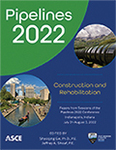Deep Learning Guided NDE Approach for Pipeline Damage Diagnosis
Publication: Pipelines 2022
ABSTRACT
Pipeline systems are widely used for transportation of natural gas, crude oil, and petroleum products. Due to aging, loading, or third-party damages, the integrity of the system is susceptible to be destroyed by defects, like cracks, corrosion, or wielding defects. The non-destructive evaluation (NDE) technique, such as ultrasonic guided waves, is sensitive for damage detection without destructing pipelines. However, the signal processing is still challenging for ultrasonic guided waves. Deep learning method, convolutional neutral network (CNN), has the ability of high-dimensional and complex data analyzation, which is feasible for guided wave signal processing. In this study, different damage states related to damage size and severity were designed. In addition, noise interference and temperature change will be considered. CNN based learning framework was established, which extracted sensitive features and predicted damages. The results demonstrated that the deep learning method was effective for damage detection, as compared to conventional physics-based approaches. It also has the robustness for noise and structural uncertainty, which increase the damage diagnosis and prognosis.
Get full access to this article
View all available purchase options and get full access to this chapter.
REFERENCES
Alleyne, D. N., and P. Cawley. “The excitation of Lamb waves in pipes using dry-coupled piezoelectric transducers.” Journal of Nondestructive Evaluation 15.1 (1996): 11–20.
Carandente, R., J. Ma, and P. Cawley. “The scattering of the fundamental torsional mode from axi-symmetric defects with varying depth profile in pipes.” The Journal of the Acoustical Society of America 127.6 (2010): 3440–3448.
Cha, Y.-J., W. Choi, and O. Büyüköztürk. “Deep learning‐based crack damage detection using convolutional neural networks.” Computer‐Aided Civil and Infrastructure Engineering 32.5 (2017): 361–378.
Gazis, D. C. “Three‐dimensional investigation of the propagation of waves in hollow circular cylinders. I. Analytical foundation.” The journal of the Acoustical Society of America 31.5 (1959): 568–573.
Gopalakrishnan, K., et al. “Deep Convolutional Neural Networks with transfer learning for computer vision-based data-driven pavement distress detection.” Construction and Building Materials 157 (2017): 322–330.
Hinton, G. E., S. Osindero, and Y.-W. Teh. “A fast learning algorithm for deep belief nets.” Neural computation 18.7 (2006): 1527–1554.
Layouni, M., M. S. Hamdi, and S. Tahar. “Detection and sizing of metal-loss defects in oil and gas pipelines using pattern-adapted wavelets and machine learning.” Applied Soft Computing 52 (2017): 247–261.
LeCun, Y., and Y. Bengio. “Convolutional networks for images, speech, and time series.” The handbook of brain theory and neural networks 3361.10 (1995): 1995.
LeCun, Y., et al. “Backpropagation applied to handwritten zip code recognition.” Neural computation 1.4 (1989): 541–551.
Liu, G., and J. Qu. Guided circumferential waves in a circular annulus. (1998): 424–430.
Pan, H., R. Ge, W. Xingyu, W. Jinhui, G. Na, and L. Zhibin. (2017). “Embedded Wireless Passive Sensor Networks for Health Monitoring of Welded Joints in Onshore Metallic Pipelines.” ASCE 2017 Pipelines.
Raghavan, A., and C. E. S. Cesnik. “Guided-wave signal processing using chirplet matching pursuits and mode correlation for structural health monitoring.” Smart Materials and Structures 16.2 (2007): 355.
Silk, M. G., and K. F. Bainton. “The propagation in metal tubing of ultrasonic wave modes equivalent to Lamb waves.” Ultrasonics 17.1 (1979): 11–19.
Sutskever, I., O. Vinyals, and Q. V. Le. “Sequence to sequence learning with neural networks.” Advances in neural information processing systems. 2014.
Umakanth, S. Deep Learning Convolutional Neural Network Applications in Image Analysis to Identify Defects. Diss. 2018.
Wang, X., et al. “Experimental investigation of reflection in guided wave-based inspection for the characterization of pipeline defects.” NDT & e International 43.4 (2010): 365–374.
Wang, X., X. Qi, Z. Lin, J. Wang, and N. Gong. (2016). “Electrochemical Characterization of the Soils Surrounding Buried or Embedded Steel Elements.” Pipelines 2016, 110–116.
Wang, X., X. Qi, Z. Lin, and D. Battocchi. (2018). “Graphene Reinforced Composites as Protective Coatings for Oil and Gas Pipelines.” Nanomaterials, 8(12), 1005.
Wang, X., F. Tang, X. Qi, Z. Lin, D. Battocchi, and X. Chen. (2019). “Enhanced Protective Coatings Based on Nanoparticle fullerene C60 for Oil & Gas Pipeline Corrosion Mitigation.” Nanomaterials, 9(10), 1476.
Wang, X., F. Tang, Q. Cao, X. Qi, H. Pan, X. Chen, and Z. Lin. (2022). “Carbon-Based Nanoparticle-Filled Protective Coatings for Enhanced Damage Tolerance and Corrosion Resistance of Structural Weldment.” Journal of Materials in Civil Engineering, American Society of Civil Engineers, 34(1), 04021384.
Xu, Y., et al. “PZT transducer array enabled pipeline defect locating based on time-reversal method and matching pursuit de-noising.” Smart Materials and Structures 28.7 (2019): 075019.
Yan, S., et al. “Pipeline damage detection using piezoceramic transducers: Numerical analyses with experimental validation.” Sensors 18.7 (2018): 2106.
Zhang, Z., H. Pan, and Z. Lin. (2019). “Data-Driven Identification for Early-Age Corrosion-Induced Damage in Metallic Structures”, Bridge Engineering Institute Conference 2019, July 22-25, Honolulu, Hawaii, USA.
Zhang, Z., H. Pan, X. Wang, and Z. Lin. (2020). “Machine learning-enriched Lamb wave approaches for automated damage detection.” Sensors, 20(6), 1790.
Pan, H., Z. Zhang, F. Tang, X. Wang, and Z. Lin. (2021). “Corrosion-induced damage detection and conditional assessment for metallic civil structures using machine learning approaches”, 2020 SPIE Smart Structures and Nondestructive Evaluation, April 26-30, Anaheim, California, USA.
Zhang, Z., H. Pan, X. Wang, and Z. Lin. (2021). ” Machine learning-enabled Lamb wave approaches for damage detection”, 2021 10th International Conference on Structural Health Monitoring of Intelligent Infrastructure, June 30th-July 2021, Porto, Portugal.
Information & Authors
Information
Published In
History
Published online: Jul 28, 2022
Authors
Metrics & Citations
Metrics
Citations
Download citation
If you have the appropriate software installed, you can download article citation data to the citation manager of your choice. Simply select your manager software from the list below and click Download.
